EJI Ink Spring 2018 Newsletter
- Director's Welcome
- Faculty Updates and News
- EJI Alumni Spotlight: Liz Bradley
- Student Articles
Director's Welcome
 By Marsha Mansfield, Distinguished Clinical Professor of Law, Director of the Economic Justice Institute
By Marsha Mansfield, Distinguished Clinical Professor of Law, Director of the Economic Justice Institute
Changes are occurring at EJI, as well, as in our communities and our country. In January, the Immigrant Justice Clinic experienced a change of leadership. Geoffrey Heeren joined us as its Director, bringing with him a wealth of knowledge and experience about immigration law and clinical teaching.
Geoff comes to the U.W. from Valparaiso, where he has been a clinical professor since 2012. He also taught constitutional law. His experience ranges from supervising students in an asylum law clinic while a Clinical Teaching Fellow at Georgetown to publishing articles on the topic of immigration, the most recent published just last year in the Georgetown Immigration Law Journal, The Immigrant Right to Work. He also has litigated immigration cases in a variety of contexts and courts. Geoff has roots in Madison, having grown up here and is delighted to be back with his wife and children.
Geoff arrived at an opportune time as the IJC was beginning its work funded by the Vera Institute. As you may recall from the fall newsletter, The Vera Institute of Justice awarded $100,000 to two area legal service providers: the IJC and Community Immigration Law Center (CILC). The funding allows the IJC to dedicate a substantial amount of time and resources to provide universal representation for detained individuals.
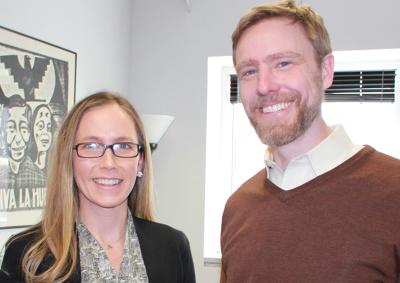 Statistics demonstrate the difference that a lawyer makes in the courtroom and nowhere is that more evident than in immigration court, where no right to counsel exists. Research published by the Vera Institute, based upon a limited study in New York, demonstrated that up to 12 times as many immigrants were able to win their cases by obtaining legal relief from deportation or at least by persuading ICE to suspend their deportation efforts when a lawyer was involved. This stunning success provided the impetus for Vera to fund programs such as the IJC. However, this one-time funding opportunity will end next fall.
Statistics demonstrate the difference that a lawyer makes in the courtroom and nowhere is that more evident than in immigration court, where no right to counsel exists. Research published by the Vera Institute, based upon a limited study in New York, demonstrated that up to 12 times as many immigrants were able to win their cases by obtaining legal relief from deportation or at least by persuading ICE to suspend their deportation efforts when a lawyer was involved. This stunning success provided the impetus for Vera to fund programs such as the IJC. However, this one-time funding opportunity will end next fall.
Obtaining the Vera Institute grant allowed the IJC to develop a half-time position and expand our clinical opportunities for students interested in immigration law. Attorney Erin Barbato, another extremely talented and knowledgeable immigration lawyer, is supervising students who are working on a variety of other immigration cases, including asylum, U-Visas, and other humanitarian immigration issues. Student participate in all aspects of the representation, including representation at final hearings in Chicago and immigration interviews at US Citizenship and Immigration Services Milwaukee Field Office, as well as, on appeals to USCIS Board of Immigration Appeals, Administrative Appeals Office, and the Seventh Circuit. They are also involved in community outreach and education, including conducting know-your-rights presentations to community groups and local non-profit organizations working with victims of human trafficking, domestic violence, and sexual assault.
These opportunities, like the other EJI clinical offerings, not only provide a significant service to our community but they are excellent learning experiences. We would like to continue making them available to as many students as are interested in exploring public interest lawyering. However, we cannot do that without your support. Your contribution, no matter the size, demonstrates your support of EJI’s work and of its role in educating our future lawyers. It allows us to increase our teaching capacity and provide additional educational opportunities to our students in the form of scholarships to conferences and seminars. Your donation makes a difference. Please take the time to donate to EJI by clicking here.
Thank you and enjoy this issue of EJI, Ink.
Faculty Updates and News
In October, Marsha, Mitch, along with some EJI students, presented to a panel of judges from Shanghai about the Economic Justice Institute and clinical education.
Geoff
- Received the Martin Luther King Award from Valparaiso University in January for his clinic's work.
- Presented “Immigration Law Review for the Criminal Practitioner,” to the Wisconsin Public Defender, University of Wisconsin Stevens Point, in February.
- Presented “Immigration and Advising: Advising Practices in the Current Sociopolitical Climate,” Panel Presentation at the University of Wisconsin Advising Conference, in February at the Madison campus.
- Presented at the American Immigration Lawyers Association advanced removal defense seminar/webinar in Washington, DC on April 12, and at the AALS Clinical Conference in Chicago in May.
Mitch
- Received an award from Joining Forces for Families (JFF) in November for his years of collaborative work assisting JFF social workers and the communities they serve.
- Presented a CLE on the Ethics of Eviction Defense at the Law and Advocacy for Racial Justice Summit in March.
- Presented at the Law School's LEO Banquet on March 17, detailing how EJI is one of many ways the Law School provides students of diverse backgrounds with Legal Education Opportunities.
 Hawks Quindel Cy Pres Award Benefits EJI
Hawks Quindel Cy Pres Award Benefits EJI
EJI is the grateful recipient of a cy pres award of over $8,000 from Hawks Quindel, a Wisconsin law firm, whose practice spans a variety of legal areas, including employment, wage & hour, and family law. Hawks Quindel has long been a generous supporter of EJI and one of its partners, David Zoeller (a NLC alum) serves on the EJI, Inc. Board. Hawks Quindel also has hired several U.W. grads who participated in EJI while in law school. As many of you know, the cy pres doctrine is a flexible means for dealing with residual class action funds that cannot be directly distributed to the beneficiaries of the lawsuit. When settlement funds are left after all payments have been made to class members, courts have approved distribution, under the cy pres doctrine, to charitable organizations including those who combat harms similar to those that injured the class members. Directing a cy pres award to EJI is a great and easy way for law firms who engage in class action work to support EJI’s work. We thank the attorneys of Hawks Quindel for this donation and for their consistent support of EJI’s work.
EJI Alumni Spotlight: Liz Bradley
By Niabi Schmaltz, (2L)
Liz Bradley was among the Immigrant Justice Clinic's very first students. She participated in the clinic during its first full year in 2012 and stayed active in the clinic throughout her three years at UW Law. After graduating in 2015, she joined the Florence Project as a staff attorney. We spoke with her about her work at the Florence Project and her reflections on her time at IJC.
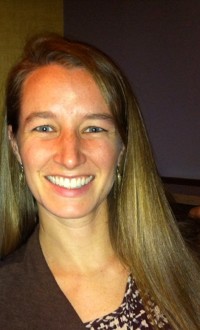
Can you tell me a bit about the Florence Project and what you do there?
The Florence Project was initially founded in Florence, Arizona, a very rural part of Arizona where a lot of the large immigration detention centers are housed. They were the founders of what's called the Legal Orientation Program (LOP) Model, which is trying to educate immigrants in detention centers who are unrepresented.
In Florence, staff attorneys would rotate and give LOP presentations in each facility. So for my first couple years at the Florence Project, that was my full-time job. I'd go in, we'd give the presentations, and then give people brief intakes to assess potential relief.
My job has transitioned a bit. We still have the LOP and a full-time staff of attorneys who do that, but our office also gets appointed to represent people who are determined to be incompetent to represent themselves. And right now that's actually been most of my job. I represent immigrants in detention who have severe mental illnesses.
What do you like most about your job?
I think it's a really empowering model, to be able to help people help themselves. We're not able to represent everyone, but being able to explain the process to someone in their own language and help them figure out what their options are is part of what I love. And I think the other part I love is the people that I work with.
What's the most challenging thing about your job?
I think the most difficult part of my job is working with people in detention. No one's having a great day when they see me because they're already in detention. I think it's heartbreaking to see how our detention policies destroy families but also destroy people.
Immigration issues have been in the political spotlight recently. Has that affected your work?
It has. I think a lot of people are more disheartened and have a lot more reason to be afraid. Under the previous administration, there were priorities for who the government was going after to deport. Because now everyone is a priority, everyone is afraid.
Do you feel that your participation in IJC has helped you now in your post-grad work?
Absolutely. I think the best part of law school for me was the clinic. I did IJC, I also did the Federal Appeals Project in the Remington Center. I think working on real-live cases with real clients absolutely prepared me for my work later. When I started my externship at the Florence Project, I had a lot more experience of how to interview clients, of how to assess for possible forms of relief, than I ever would have gotten just in a classroom.
Do you have any words of wisdom to share with current EJI students?
One piece of advice is to take every clinical opportunity available that you can. I just think working on real cases, actually grappling with the law and seeing what that actually looks like outside of a textbook, is the best way you can prepare yourself to be a lawyer when you graduate.
For people who really want to do social justice work, it is a long distance run, it is not a sprint, and if you treat it as a sprint you will get burnt out and you're useful to no one. You've got to take care of yourself to be in it for the long haul.
Any final thoughts?
I'm really proud of the Law School for keeping the Immigrant Justice Clinic. I do think it's an extremely valuable asset for the students to have, and I hope to see the Clinic continue on for many years in the future and continue to do great things.
Student Articles
A Little Information Goes a Long Way
By Hannah Clayshulte, (2L)
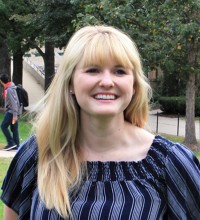
Working at the Consumer Law Clinic, I receive multiple phone calls every day from people with all kinds of consumer issues. One of the most common calls I receive involves debt collection. People are afraid and confused when they are suddenly thrust into a confrontational relationship with a debt collector. I have helped many people with debt collection issues simply by informing them of their legal rights and discussing the modern debt collection process, as I describe below.
In 1978, Congress enacted the Fair Debt Collection Practices Act (FDCPA), which applies to any person who regularly collects debts owed to others, including attorneys who collect debts on behalf of others on a regular basis. The Act does not apply to creditors or their affiliates. The FDCPA sets a baseline for states, but some states take enforcement a step further. Wisconsin, for example, has a stringent set of additional specific prohibitions that apply both to third party debt collectors and to creditors under Chapter 427, part of the Wisconsin Consumer Act.
After a certain amount of time, creditors are required to "write off" unpaid debts as losses. This does not mean the debt disappears. Instead, it usually means that creditor sold the debt for pennies on the dollar to third party collectors, who usually purchase spreadsheets containing very little information (such as name, phone number, and amount owed). Information is never guaranteed to be accurate, and mistakes often occur. Debt can be sold over and over again. The more times it is sold, the more likely it will end up in the hands of a less reputable debt collection agency. Consumers have the right to tell the collector to stop its contact and communication. This information brings a sense of relief to worried individuals who call the CLC.
Finally, a common debt collection practice is to serve the consumer with a summons and complaint, simply because over 90% of consumers served do not show up to court. Many consumers do not recognize the plaintiff’s name because it is a debt buyer. The CLC is taking cases of this nature because a default judgment is difficult to reverse, and because the consumer may have been the target of unlawful debt collection practices.
Client Centered Learning
By Sara Matthews, (2L)
As any lawyer or law student will readily tell you, the first year of law school is overwhelming. I wasn’t used to reading 100 pages of dense material each night. In the middle of the anxiety surrounding final exams, writing on to a journal, and competing for summer jobs, it was easy to lose sight of why I decided to attend law school in the first place. After a year of cold-calling and briefing cases, I was eager to experience the practice of law rather than just read about it. I truly wanted to take part in Wisconsin’s famous “Law in Action” approach to learning.
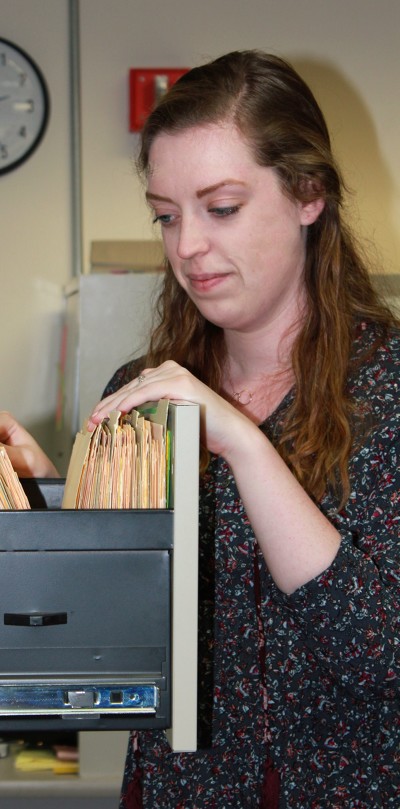 Taking advantage of the Law School’s clinical opportunities, I applied to be a part of the Family Court Clinic. Accepting the position was as exciting as it was terrifying. As much as I wanted to dive into the realities of practicing law, I had little or no direct experience interacting with and handling my own clients. The thought of being responsible for an individual’s relationship with his children or the outcome of her divorce seemed more overwhelming than all of the reading I had done the previous year. Who would trust me with such an important aspect of their life?
Taking advantage of the Law School’s clinical opportunities, I applied to be a part of the Family Court Clinic. Accepting the position was as exciting as it was terrifying. As much as I wanted to dive into the realities of practicing law, I had little or no direct experience interacting with and handling my own clients. The thought of being responsible for an individual’s relationship with his children or the outcome of her divorce seemed more overwhelming than all of the reading I had done the previous year. Who would trust me with such an important aspect of their life?
The first client interview I conducted left much to be desired. My notes were disjointed. I failed to ask basic questions, and my substantive knowledge of family law seemed to disappear. I constantly had to call my client back to ask more questions, clarify answers, and plan next steps. My nerves often got in the way of my ability to communicate effectively and efficiently, leading to more calls and meetings.
Little by little, the more I spoke with my client, the less nervous I began to feel. I could anticipate the questions my client would ask, and I felt confident in my answers. I didn’t worry each time I picked up the phone to call. When I met with my client, we talked about more than just her case; we also discussed how she was emotionally handling her situation and any other struggles she was experiencing. I believe building this rapport with my client not only enabled me to reach a desirable outcome in her case, but also improved my overall skills and confidence as a future lawyer.
Now when I take on a new client, I am able to start stronger and more focused. I feel more comfortable asking difficult questions, delivering disappointing news, and explaining confusing legal concepts. I still stumble and struggle for words or miss asking basic questions, but it happens less frequently. And when it does, I don’t feel as awkward when I need to contact my client for clarification.
My confidence with my clients has spilled over into speaking with community members who receive limited assistance from the FCC at the Dane County Courthouse. Over the past ten months, I have been able to tailor my appointments to help each individual as much as I can in the hour we have together. For some, that means explaining the process and helping them complete family law paperwork, while for others it means being an empathetic listener to their story.
Each of the six FCC students completes three appointments at the courthouse each week. That translates into each student assisting over 100 community members since we started in June, in addition to our personal clients. As I rapidly approach my final weeks in the clinic, I am reminded of why I decided to attend law school in the first place: to help people. Looking back on my year with the Family Court Clinic, I think I helped my clients just as much as they have helped me.
Empowering Pro Se Family Law Litigants
By Heather Twitchell, (2L)
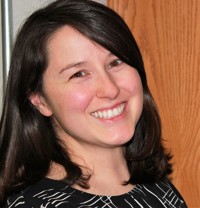 The average, unrepresented individual seeking a divorce in Wisconsin must file at least thirteen forms with the county court and associated offices over the course of several months, before the court will grant a divorce. This sea of paperwork is so overwhelming that it should be no surprise that someone accept the status quo, oppressive or miserable as it may be, rather than undertake the steps necessary to move on with one’s life. It is this very thought which motivates me every Friday morning as I make my way to the Dane County Courthouse for weekly intakes.
The average, unrepresented individual seeking a divorce in Wisconsin must file at least thirteen forms with the county court and associated offices over the course of several months, before the court will grant a divorce. This sea of paperwork is so overwhelming that it should be no surprise that someone accept the status quo, oppressive or miserable as it may be, rather than undertake the steps necessary to move on with one’s life. It is this very thought which motivates me every Friday morning as I make my way to the Dane County Courthouse for weekly intakes.
In addition to representing clients, the Family Court Clinic dedicates eighteen hours every week to providing guidance low-income pro se individuals, on child support, filing for divorce, filing a restraining order, and numerous other family law matters. The last nine months representing clients through the FCC have fulfilled my passion for service in a way I never would have imagined. But it is through these simple, one-hour intake sessions every Friday that I get to personally witness the incredible impact that our service makes on the community.
A typical session may start with a woman rushing to our office in a work uniform, late because she could not find parking. Frazzled from the rush, and before she even sits down, she exclaims that she needs child support. She reveals to me her situation, along with all her frustrations and fears, as if I have been her personal confidant since childhood. She then begins to cry, shedding tears that only a parent who loves her children more than her own well-being will shed before a complete stranger. I sit in silence and soak up the important details, being sure to acknowledge her struggle, because often that is what she needs, and while I can’t be her lawyer, for one hour, I can be her rock. After a few minutes, we get to work, and over the course of one hour, I witness a transformation. Somehow, after describing the law, explaining court procedures, and filling out pages of forms together, this woman has become empowered. She understands terms, which have only ever been spoken around her, or at her; she has gained confidence in the justice system, and, most importantly, in her ability to achieve that justice. She has regained a sense of purpose and worth, which has often been lost over the years due to domestic violence or other difficult circumstances. She leaves smiling, despite the arm-full of paperwork she’s carrying ready to be stamped by the court.
This weekly experience has been hands-down the most satisfying aspect of my law school career and it has taught me so many invaluable lessons about family, community service, and the law. I now understand how we as future legal advocates possess an incredible power to empower others. And while we don’t have all the answers, our time, attention, and indispensable insight into the formidable legal world is often all someone needs to make a necessary change in their life. In the years that follow graduation, I’ll remember the property case about the saucy intruder that was a fox, the suspense of being on call in Tax I, the color of the library walls, and this – the sight of dozens of mothers, fathers, spouses, and concerned grandparents who walked into our Courthouse office crying and left with their heads held high.
Collecting from a Con-Man
By Sophia Rogers, (2L)
Readers of this newsletter might recall a Neighborhood Law Clinic wage theft case that went to trial last year. The owner of a cleaning company, “Scott,” hired our client, “Mary,” to clean two office buildings. After Mary performed the work, Scott refused to pay her. When contacted by her advocates and investigators, Scott pretended he didn’t even know Mary.
Last year’s students faced multiple obstacles tracking down Scott and piercing the corporate veil between Scott and his LLC. They ultimately won the case for Mary last spring. Scott owed a judgment to our client and all we had to do as the new students on the case was collect. Easy, right?
As it turns out, collections can be extremely challenging. Especially when the debtor is evasive and does not answer questions truthfully despite being under oath.
When Scott refused to pay the judgment last year’s NLC students attempted to garnish his bank account. The bank reported that Scott had emptied and closed the account. Rats! The students filed a motion for contempt. To avoid a contempt judgment, Scott filed a financial disclosure form that appeared incomplete, as it did not list any assets or income. He even claimed he was not married. Were we at a dead end?
My team inherited the case at this moment. We knew that Scott’s wife had opened a new company almost identical to the old company that had hired Mary, so we suspected that Scott simply transferred money into that account. We questioned him at a supplemental examination, a procedure in which debtors answer creditors’ questions about their financial assets under oath, in front of a commissioner. We questioned Scott about his wife’s company and his financial assets. He denied any involvement in his wife’s company and refused to disclose any information about his financial assets.
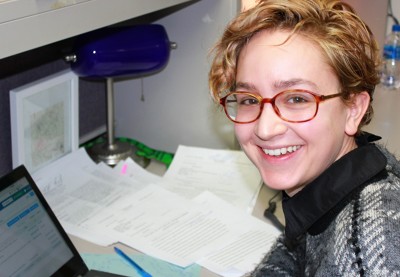 NLC kept thinking. We decided to amend the judgment under the doctrine of successor liability to include the new company as an additional debtor. However, we knew that as soon as we took this step, the money would disappear from the new company’s account before the judge could make a ruling. So we got creative. We filed an ex parte motion asking the judge to enter an injunction that would freeze the new company’s bank account temporarily, pending a hearing to amend the judgment. “Ex parte” means court approval without first giving notice to Scott, because otherwise he would just close down the account. We wrote a lengthy affidavit to demonstrate the “extraordinary circumstances” deserving of this type of request and convinced the judge to issue an injunction freezing the account.
NLC kept thinking. We decided to amend the judgment under the doctrine of successor liability to include the new company as an additional debtor. However, we knew that as soon as we took this step, the money would disappear from the new company’s account before the judge could make a ruling. So we got creative. We filed an ex parte motion asking the judge to enter an injunction that would freeze the new company’s bank account temporarily, pending a hearing to amend the judgment. “Ex parte” means court approval without first giving notice to Scott, because otherwise he would just close down the account. We wrote a lengthy affidavit to demonstrate the “extraordinary circumstances” deserving of this type of request and convinced the judge to issue an injunction freezing the account.
While we waited for the motion hearing, we tried to question Scott’s wife. Wisconsin is a community property state, so Scott and his wife share ownership of all of their assets. We scheduled another supplemental examination to find out where she had her personal account. Scott’s wife failed to show to the court-ordered examination. We later learned that we probably could have filed a garnishment against Scott’s wife, even though she was not a named debtor.
At the hearing motion on our motion to amend judgment hearing, we convinced the judge add the new company to the judgment as a “mere continuation” of the previous company, and as part of Scott’s scheme to evade paying his debt. After winning the motion, the bank released the funds that had been frozen, but we only recovered a small amount of the total owed to Mary. Rats again!
We moved for contempt against the wife because she had violated the order to appear for a supplemental examination. She and Scott both showed up at the courthouse for the hearing. Just fifteen minutes before the hearing was about to begin, they came over and offered to pay. Finally, some economic justice for Mary!
Most unpaid workers (and even many law firms) would have given up on this case months ago, but I am so glad we were able to do this for Mary. We were able to write, research, and prepare for oral arguments as part of this process. Future teams will be better at collecting because of the lessons we learned and Mary finally recovered her wages.

